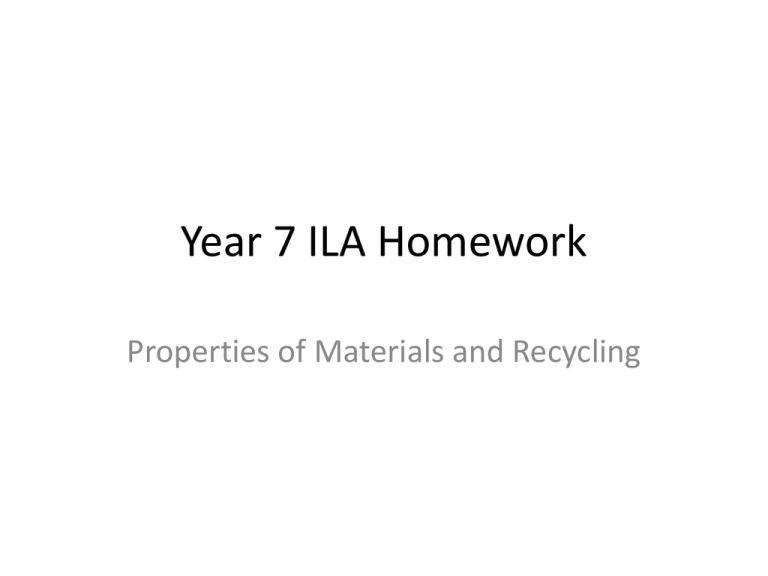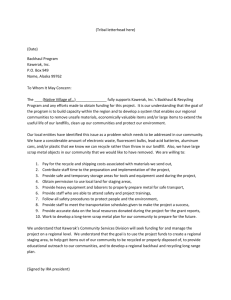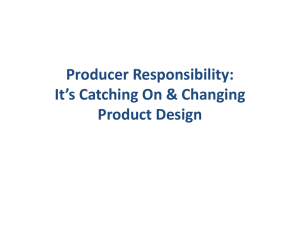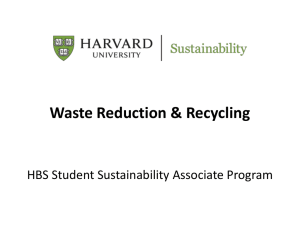Homework Objective 1 - Wanstead High School
advertisement

Year 7 ILA Homework Properties of Materials and Recycling Homework Objective 1 To be able to identify standard recycling symbols GUIDANCE/SUPPORT for homework 1 Recycle Recycling means that you take the material used for a part, break it down or melt it and use it to make a new part. Recycling can be carried out for metals and many different types of wood, plastics, card and paper. It is easiest to recycle products that are made from only one material. Unfortunately, many products are made up of lots of different parts and materials, which means that they need to be taken apart to allow recycling. As a result, it can sometimes cost more to recycle than it would to make new material. Homework Task 1 - Identify the standard recycling symbols shown below from 1 to 6 Products containing materials that can be recycled are often marked to show the material that they are made from. 1 2 3 4 6 5 Recycling Images courtesy of : http://www.recyclenow.com/why_recycling_matters/recycling_symbols.html http://www.warwickshire.gov.uk/web/corporate/pages.nsf/Links/513B04AAB66E868B80256EBD00338A6E Extension Get photographic evidence of SIX plastics products that each have the ONE of the SIX different numbers in the recycling triangle (i.e. Numbers 1 to 6) to Homework Objective 2 To be able to analyse an existing products in detail. Homework Task 2 – Product Analysis Choose an existing product made from wood and metal or plastic and metal, then analyse each part of the product by answering the following questions: 1. What is the function of the product? 2. What is the function of each part of the product? 3. What is the properties of each material ? Note • The product must have minimum of THREE different types of materials • You can use the sheet of A4 provided TIPS Be selective and only use relevant information in your analysis Avoid simple descriptions in your analysis Products Analysis Homework Task 2 – Product Analysis Objective: To be able to analyse an existing products in detail. Task: Choose an existing product made from wood and metal or plastic and metal, then analyse each part of the product by answering the following questions. What is the function of the product? What is the function of each part of the product? What is the properties of each material ? The product must have minimum of THREE different types of materials Be selective and only use relevant information in your analysis Product 1 Avoid simple descriptions in your analysis GUIDANCE/SUPPORT for homework 2 Properties of materials Different materials have different properties. This means that each material might perform differently when tested or used in the same way. When you are designing a product, you need to choose a material that has the properties needed by your product. GUIDANCE/SUPPORT for homework 2 Properties of materials Some of the questions that you may ask and some of the material properties that you might find related to materials are shown in the table below. Here is an examples of product analysis Products Analysis Product: Stainless Hand Trowel Function of Trowel: Digging and planting Objective: To be able to analyse an existing products in detail. Wooden Handel Stain steel Metal ring Made from stain steel to protect the handle from soil made from strong Ash wood To comfortably hold and use the blade Stain steel Shaft Hanging thong Made from stain steel for maximum durability. made from leather to hang the trowel when is not in use. Plastic tag made from thermoplastic to show the company’ name/to promote the company Stain steel Blade Polished stainless steel for easy movement through soil and rust resistance string Card Label made plastic/ cotton To hold the label Can be printed on to show size , price and company’s details etc Task: Choose an existing product made from wood and metal or plastic and metal, then analyse each part of the product by answering the following questions: What is the function of the product? What is the function of each part of the product? What is the properties of each material ? You can use the sheet of A4 provided TIPS Avoid simply describing the obvious things about existing products; try to show that you are making judgements.











